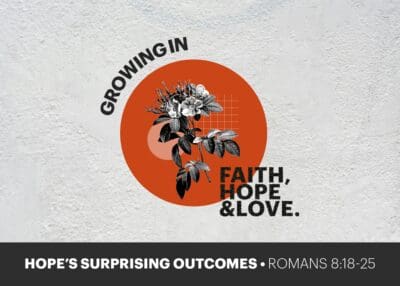“Children have I reared and brought up, but they have rebelled against me.” (Isaiah 1:2)
This is one of the most striking statements from the mouth of God in the Old Testament: “I raised children and they have rebelled against me!” God said that!
Three Observations
God has children.
The reference here is to Israel. God brought the 12 tribes descended from the sons of Jacob out from slavery. He adopted these people as his own children. He made a covenant with them in which he said, “I… will be your God and you will be my people” (Lev. 26:12).
God raised these children.
“Children have I reared and brought up!” (Isaiah 1:2)
These children were the focus of God’s constant care and his loving attention. God bonded with them. He invested himself in them, gave himself to them. Like any parent, he did this with joy and affection, because they were his children!
What does it cost to raise a child? I googled that question and here’s what I found: The average cost of raising a child born in 2013 (up until age 18) for a middle-income family in the U.S. is approximately $245,340 (or $304,480, adjusted for projected inflation). [1]
It’s no small thing to raise a child. So honor your father and mother. You have no idea what it cost your mother to bring you into the world. Surround her with affection and honor, and do the same with your father. It is God’s command and it comes with a promise: “That your days may be long” (Deut. 5:16).
God’s people were the constant object of his loving care. He gave them a home, bringing them into the land of Canaan. He provided their food in the desert, and then in the land flowing with milk and honey. He guided them in all of their ways, by a pillar of fire and cloud, and then by showing them the path of life through his law. And he guarded and protected them from all of their enemies.
God’s children rebelled against him.
“But they have rebelled against me.” (Isaiah 1:2)
Who are the ‘they’ God is talking about? The children for whom he has provided. The children on whom God has lavished love and attention!
This is a verse for parents in pain. God gave you a son or a daughter. You have loved them, and you have raised them, and you have extended yourself on their behalf, but now your son or your daughter has rebelled against you. God knows what that is like!
God’s rebel children don’t want to listen to him.
Hear, O heavens, and give ear, O earth; for the Lord has spoken. (Isaiah 1:2)
Why is God speaking to the heavens and the earth? Because his children aren’t listening to him. Matthew Henry says, “Despairing to gain an audience with the children of his people, [God] addresses himself to the heavens and the earth and calls for their attention.” God knows what it is like when your children don’t want to listen to you.
God’s rebel children don’t want to know him.
“The ox knows its owner, and the donkey its master’s crib, but Israel does not know, my people do not understand.” (Isaiah 1:3)
There’s something against nature here. Even in the animal kingdom an ox or donkey knows its owner. They know where their food comes from. But God’s children don’t know him and
they don’t want to know him! They have the most distorted ideas about him. They have forsaken him. They despise him, and they’re estranged from him (1:4).
The ones God raised have no interest in relationship with him, only in what they can get from him. You can’t read these verses without feeling the great pathos in the heart of God: “I raised these children and they have rebelled against me!”
There will be parents in the congregation today who know this pain. You raised children. You did your best for them. You extended yourself in patience and in kindness, but they don’t listen to you, they don’t want to know you, they don’t want you in their lives.
If this is your experience, you may find yourself saying, “What did we do wrong? How has it come to this?” There are no perfect parents and all of us see things that we would do differently if we had our time over again. But listen to this: You can’t be a better father than God. You can’t do a better job of raising children than God who says, “I raised children and they rebelled against me.”
There is help and comfort here for troubled parents. God knows your pain. He is a father and he knows this pain is in his own heart. Children can rebel against even the most perfect parent. Knowing that children raised by a perfect father rebelled against him will help you if one of your children should rebel against you.
Why We Are Looking at These Verses of the Bible
These verses speak to us at multiple levels…
These words speak to our nation.
Israel had been blessed as a nation. They carried the name of God. They experienced the blessing of God. They turned away from God. That was their story.
This speaks to us today. I am not, of course, drawing a direct parallel between Israel and America. God made a national covenant with Israel that he has not made with any other nation. It still stands. It has never been revoked and it never will be.
But our country has, in a very real sense, carried the name of God. Every dollar bill carries the words ‘in God we trust,’ and it’s the God of the Bible that is referred to there. As a nation we have experienced the blessing of God, and as a nation there is a sad and an increasing turning away from God.
An increasing number of Americans don’t want to listen to God and don’t want him to have a place in their lives. In the years since I came to the United States, attendance at church in this country has halved. It was 35% in 1999. It is an estimated 17% today.
People don’t want to listen to God. Increasing numbers don’t want to know him or to have him in their lives. As a nation it could be said of us that we have forsaken the Lord, despised the Holy One, and are utterly estranged (1:4).
These words speak to the church.
These words are spoken to God’s people. Is there a sense in which the church in America today has forsaken the Lord, despised the Holy One, and become estranged (1:4)?
In large measure Christianity in America has become, not about God, but about us: “What do people want?” That’s the great question. Why? Because even in the church, we have become more interested in fulfilling our desires than in obeying his commands. We have become more interested in what pleases us than in what pleases the Lord.
These words speak to us personally.
Whenever we open the Bible, God calls us to examine our own hearts. When we see what is wrong with the world and what is wrong in the church, we must examine our own hearts. If we do, we will often find that the roots of the sins we see in others are often hidden in our hearts as well.
Portrait of God’s Rebel Children
Laden with iniquity
Ah, sinful nation, a people laden with iniquity… They have forsaken the LORD, they have despised the Holy One of Israel, they are utterly estranged. (Isaiah 1:4)
They are ‘laden with iniquity.’ Imagine that every sin is a rock. And every time they sin a rock is placed in a bag that they carry on their backs. They live under the weight and burden of this. And how did this happen? How did they come to be laden with iniquity?
1. They have forsaken the Lord (1:4).
They moved away from God.
2. They have despised the Holy One of Israel (1:4).
The resist holiness because they despise God himself.
3. They are utterly estranged (1:4).
‘Estranged’ means not speaking. They have no interest in contact or communication. To be estranged from a person means that you don’t see them and you don’t want to see them. That’s how it is with the rebel children towards God and so they are laden with iniquity.
Bruised and bleeding
Why will you still be struck down? Why will you continue to rebel? The whole head is sick, and the whole heart faint. (Isaiah 1:5)
The word ‘struck down,’ could also be translated ‘smitten.’
- The whole head is sick (1:5).
They can’t think straight and so they don’t reason well, and they’ve lost the connection between actions and consequences. - The whole heart [is] faint (1:5).
This person is worn out, flagging, and no longer has energy (Psalm 32:3-4). - There is no soundness in it, but bruises and sores and raw wounds (1:6)
This is an awful picture. There are awful wounds from the top of the head to the souls of the feet. And the wounds are not ‘pressed out.’ The infection has not been squeezed out of the wounds. The pus remains, so the wounds of the past that have never been healed keep re-infecting this person’s life.
They never heal. Why? The wounds are not ‘bound up’ or ‘softened with oil.’ The torn flesh dries out and become hard, so it cannot close over the wound. It continues to re-infect. And this is true of the whole body from the sole of the foot to the top of the head.
Alone and vulnerable
The daughter of Zion is left like a booth in a vineyard, like a lodge in a cucumber field, like a besieged city. (Isaiah 1:8)
Three pictures and they are all pictures of being alone, isolated, and vulnerable: Like a booth in a vineyard, like a lodge in a cucumber field, like a besieged city. It really is a desperate picture. At the end of the day, it doesn’t really matter if you’re surrounded by all kinds of wealth, when you are alone. What hope is there when things are as bad as this?
The Hope
The remnant
If the LORD of hosts had not left us a few survivors, we should have been like Sodom, and become like Gomorrah. (Isaiah 1:9)
The reference to ‘a few survivors’ brings us to a very important truth in the Old Testament; the doctrine of the remnant. Even when large numbers of people fell away, God always had some who continued to be faithful, and he gets his work done in the world through them.
This is a very important theme. God talks about the remnant in a number of ways: The tree gets cut down and it is only a stump, but out of the stump comes a new shoot (see Isaiah 11:1). Even when there is a massive falling away, God still has a remnant of people and he gets his work done through them.
Paul takes up this theme of the remnant in the New Testament. He explains that God always has his own people even when there is widespread turning away from him. It was like that in the time of Elijah. Elijah said, “I even I only am left.” But God said to Elijah, “I have kept for myself seven thousand men who have not bowed the knee to Baal” (Rom. 11:4). Then Paul says, “So too at the present time at there is a remnant, chosen by grace” (Rom. 11:5).
At the time when Paul wrote, the vast majority of Jewish people did not believe in Jesus Christ, but some did. There was a remnant. This is still true today. We have good reason to believe that in the last days the few will become many, because Paul says, “All Israel will be saved” (Rom. 11:26).
The point here is that whatever the trend, God never lets his people go. Thank God for that, because if God’s people had been wiped out in the time of Isaiah, God would not have kept his promise to preserve his people and Christ could not have come into the world. But Christ was born to the house of Israel. He was the seed of Abraham, born into the line of David.
The hope when there is a great defection, when there is a widespread forsaking of God, a despising of the Holy One, God’s great purpose gets accomplished through the remnant.
How can there be a remnant?
The Lord of hosts
If the LORD of hosts had not left us a few survivors, we should have been like Sodom, and become like Gomorrah. (Isaiah 1:9)
Isaiah speaks of God as the ‘Lord of hosts’ 62 times. ‘Lord of hosts’ means Lord of many. He is captain of a great army. It can be translated as “The Lord, the all-powerful king.” Have you ever come to a place where you feel, I don’t know if even God can help me? Have you ever said that? Have you ever thought that?
When you feel like that take a look at this God and see who he is. He is the Lord of hosts! He is the God of infinite power and his resources are unlimited. He is the God who always accomplishes his own purposes in the world and in his own people.
The suffering Savior
We are looking at the opening chapter of the prophecy of Isaiah. At the heart of this marvelous prophecy there is Isaiah 53, one of the best know passages in the entire Old Testament. Isaiah speaks of the suffering Savior, who was to come, the one who would be wounded for our transgressions and bruised for our iniquities.
I wonder if you’ve noticed the connections between the Isaiah 1 and Isaiah 53? In both chapters you have a body, bruised and wounded. In chapter 1, it is the wounded body of God’s rebel children. In chapter 53, it is the bruised body of God’s one and only Son.
In Isaiah 1:5, God’s rebel children are ‘struck down’ or smitten. But in Isaiah 53:4, the smiting was on God’s Son: “We esteemed him stricken, smitten by God, and afflicted.”
In Isaiah 1:6, God’s rebel children are bruised. In Isaiah 53:5, the bruising was on God’s Son:
“He was wounded for our transgressions, he was bruised (or crushed) for our iniquities.”
In Isaiah 1:6, God’s rebel children have raw wounds. In Isaiah 53:5, the open wounds are on the back of the Son of God: “With his stripes (or wounds) we are healed.”
In Isaiah 1:4, God’s rebel children are laden with iniquity. In Isaiah 53:6, the iniquity is laid on God’s Son: “The Lord has laid on him the iniquity of us all.” Here he is, Jesus Christ, the suffering Savior, and what is he doing? Standing in the place of his rebel children.
How can there be a remnant? There will be a remnant because of God’s almighty power. He is the Lord of hosts and, with him, nothing is impossible. There will be a remnant because of the suffering Savior, who comes and stands in the place of God’s rebel children and through his suffering becomes our Redeemer. He is the one who is alone, and on the cross he is isolated from the knowledge of God, “My God, my God, why have you forsaken me?”
The gift of the Holy Spirit
The great work of the Holy Spirit is to gather the remnant, to awaken some from among God’s rebel children, show them their need, and bring them to the Savior in faith and in repentance, to give these children a new heart, a heart that loves God, a heart that seeks him, a heart that longs for holiness.
Christ gave to his disciples this great promise: “I will not leave you as orphans. I will come to you” (John 14:18). “You won’t ever be like a booth in a vineyard or like a lodge in a cucumber field. You will not be like a besieged city. I will come to you. I will be with you. I will never leave you and I will never forsake you.” This leaves me saying, “Lord, I want to be among the remnant!”
Two Kinds of People
At the end of the day, there are two kinds of people:
1. People who do not know God (1:3). 2. People who have forsaken the Lord (1:4).
1. People who despise holiness (1:4). 2. People who are laden with iniquity (1:4).
1. People whose wounds are like open sores (1:6). 2. People who are divided, isolated, vulnerable, and alone (1:8).
There are also:
1. People who know him. 2. People who have returned to him.
1. People who pursue holiness, because they love the Holy One of Israel. 2. People whose iniquity is pardoned.
1. People whose wounds are being healed. 2. People who are no longer alone because God brings them together in the body of which Jesus Christ is the head.
Thank God for the remnant! “If the Lord of hosts had not left us a few survivors, we should have been like Sodom, and become like Gomorrah” (1:9).
[1] According to the latest annual “Cost of Raising a Child” report from the U.S. Department of Agriculture, Aug 18, 2014. I assume that for larger families there are some economies of scale! It does include housing and transportation.





